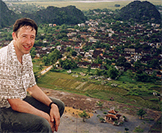The Chair's Research Team
The Researchers

Bernard
Bernier, Ph. D., Anthropologist
(bernard.bernier@umontreal.ca)
Dominique
Caouette, Ph. D., Political scientist
(dominique.caouette@umontreal.ca)
Jean
Michaud, Ph. D., Anthropologist
(Jean.Michaud@ant.ulaval.ca)
Jean Michaud is a social anthropologist
and specialises since 1988 on issues of social change
among highland populations of Asia.

After completing a Masters on
the Ladakhi (Indian Kashmir) at Université Laval
(Québec), he wrote a doctoral dissertation at Université
de Montréal (1995) on social change and tourism
in a Hmong village of Chiang Mai province, northern Thailand.
After a post-doctoral fellowship with the International
Development Research Center of Canada, he was Assistant
Professor (Lecturer) for seven years in the Centre for
South-East Asian Studies at the University of Hull, United
Kingdom.
His broad research interests
lie in understanding the rapport minorities have with
the State in relation to the aggressive discours de
vérité regarding the protection of highland environments
in the Mainland Southeast Asian massif, allegedly endangered
by the highland populations and their long practice of
swiddening. His work aims at demonstrating that highland
populations should become part of the solution, not merely
be used as the convenient culprits in complex geopolitical
games. Interrelated themes he explores include social
change in lineage groups and the long-term processes of
cultural and economic adaptation of minority/indigenous
populations in response to national and international
pressures linked to globalization. Within a cluster of
theoretical perspectives contesting both the neo-liberal
growth agenda and the nihilism of post-modernism, a large
part of the intellectual framework for his research is
provided by a position promoting local/indigenous knowledge(s)
and multiple voices.
His field-based investigations
focus on the highlands of Vietnam and Laos where he examines
how minorities adapt to changing livelihood imperatives
and ideological shifts typical of the post-Socialist agenda
prevalent in these two countries. He explores in situ
how identities in highland societies transform in relation
to national identity and he analyses the fluctuations
in the channels of exchange and consumption via marketplace
exchange. He is also involved in researching the history
of non-literate peoples on the fringes of historical empires,
and the consequences of this heritage today. This interest
materialises into gathering and analyzing oral history
and indirect evidence such as that contained in archives,
in particular colonial missionary and military archival
deposits. He is currently working on the completion of
a book titled 'Incidental' Ethnographers. Catholic
Missions in Upper Tonkin (Vietnam), 1880-1930, to
appear in 2007 (Brill Academic Publishers).
Current research
-
Échange
et commerce sur les places de marchés des hautes terres
du nord du Vietnam. Fonds Québécois pour la Recherche
sur la Société et la Culture (FQRSC), (Comité de Géographie,
2004-2007, avec Sarah Turner, McGill)
-
Vers
une gestion durable des ressources forestières
basée sur les savoirs locaux. Le cas de districts
montagneux de la province de Louang Phrabang, Laos.
Conseil de recherche en Sciences humaines du Canada
(Comité Géographie, 2003-2006, avec Yann
Roche, UQAM).
-
Dynamics of Marketplace Exchange and Trade in Highland
Northern Vietnam. Four case studies from Lao Cai province.
Conseil de recherche en Sciences humaines du Canada
(Comité Géographie, 2003-2006, avec Sarah
Turner, McGill).
Partial list of publications
Books:
-
Michaud J., 2006, Historical Dictionary of the Peoples of the Southeast Asian
Massif. Lanham (MD): Scarecrow Press.
-
Tapp, N., J.Michaud and C.Culas,
G.Y.Lee (Eds) (2004) Hmong/Miao in Asia. Chiang Mai
(Thailand) : Silkworm, 500p.
-
Michaud, J. (Ed.) (2000) Turbulent
Times and Enduring Peoples. The Mountain Minorities
of the South-East Asian Massif. London (UK): Curzon
Press, 255p.
Articles et chapitres:
-
Michaud J. et S.Turner, 2006,
Sa Pa: Contested representations of a hillstation in post-Socialist
Viet Nam. Annals of Tourism Research. (in press)
-
-
-
Michaud, J. (2004) "Hmong"
and "Montagnards", in Ooi Keat Gin (ed) Southeast
Asia: A Historical Encyclopedia, from Angkor Wat to
Timor, ABC-Clio.
-
Michaud, J. et S. Turner (2003)
« Tribulations d’un marché de montagne
du Nord-Vietnam » dans Études rurales.
n° 165-166: 53-80, janvier-juin.
-
-
Michaud, J. et M. Picard (dir.)
(2001) « Tourisme et sociétés locales
en Asie orientale », numéro thématique
de Anthropologie et Sociétes. 25(2). Incluant
:
-
-
Turner, S., A. Hardy and J.
Michaud (Eds) (2000) “Migration, markets and social
change in the highlands of Vietnam”, numéro
thématique de Asia-Pacific Viewpoint. 41(1).
Incluant :
-
Michaud, J. (1998) «
Tourisme et contrôle étatique dans les
périphéries nationales. Études
de cas chez des minorités montagnardes d'Inde
et de Thaïlande » dans F. Michel (dir.) Tourismes,
Touristes, Sociétés. Paris: l'Harmattan.
Pp. 289-314.
-
-
Culas, C. and J. Michaud (1997)
“A contribution to the study of Hmong (Miao) migrations
and history” in Bijdragen Tot de Taal-, Land-
en Volkenkunde (BKI) 153-II : 211-242.
-
Michaud, J., (1997) “A
Portrait of Cultural Resistance. The Confinement of
Tourism in a Hmong Village in Thailand” in M.Picard
et R.E.Wood (dir.) Tourism, Ethnicity and the State
in Asian and Pacific Societies. Honolulu: University
of Hawai’i Press. Pp. 128-154
-
-
Michaud, J. (1995) “Frontier
Minorities, Tourism and the State in Indian Himalaya
and Northern Thailand : 84-99” in M. F. Lanfant,
J. B. Allcock and E. M. Bruner (dir.) International
Tourism. Identity and Change. London: Sage, Studies
in International Sociology.
A few book reviews:
-
Duncan, Christopher R.
(ed.), 2004, "Civilizing the margins. Southeast Asian
Government Policies for the Development of Minorities."
Ithaca, NY: Cornell U. Press. (2005) Asian Ethnicity (in press)
-
Khong Dien, 2002,
"Population and ethno-demography in Vietnam." Chiang Mai (Thailand):
Silkworm Books. 207p. (with D.Bélanger). (2005) American Anthropologist
107(2):281-2
-
Schrauwers, Albert (2000)
“Colonial 'Reformation' in the Highlands of Central
Sulawesi, Indonesia, 1892-1995”. Toronto: University
of Toronto Press. (2004) Anthropologie et Sociétés
(sous presse)
-
Delouche, G. (ed.), 2003,
"Religions et États en Indochine contemporaine." Paris:
ACHCPI. (2004) The New Zealand Journal of Asian Studies 6(2).
-
Harrison, David (ed.) (2001)
“Tourism and the less developed world. Issues
and case studies”. CABI Publishing, Oxon (UK)
(2003) Tourist Studies 2(3): 313-4
-
Litzinger, Ralph A. (2000)
“Other Chinas. The Yao and the Politics of National
Belonging. Duke University Press”. Durham (USA)
and London (2002) The Journal of Asian Studies 61(2):
706-7
-
-
-
Formoso, B. (2000) «
Identités en regard. Destins chinois en milieu
bouddhiste thaï ». Paris : CNRS Editions,
Editions de la maison des Sciences de l’Homme,
Collection ‘Chemins de l’Ethnologie’.
(2001) The Journal of the Royal Anthropological Institute
7(4): 816-7
-
King, V.T. (1999) “Anthropology
and Development in South-East Asia: Theory and Practice”.
Kuala Lumpur: Oxford University Press. (2000) The Journal
of Asian Studies 59(4): 1094-5
Yann
Roche, Ph. D., Geographer
(roche.yann@uqam.ca)

Yann Roche is associate professor with the
department of geography at the Université du Québec à Montréal. He specializes
in cultural and human applications of geographic information systems, notably in
water catchment area settings. His teaching areas are mainly: spatial analysis,
digital mapping, and quantitative methods. He participated, with Raoul Etongué-Mayer
of the Laurentian University, in writing the Dictionnaire des termes géographiques
contemporains (dictionary of contemporary geographic terms) published by Guérin.
Actif au sein de diverses équipes,
il est membre du GEIGER, il est associé au Centre
de Recherches en Géomatique de l’Université
Laval et il est membre de l'Observatoire International de
Géopolitique (basé à l'UQAM). Ses derniers
projets impliquent la gestion des ressources naturelles
dans le Nord du Vietnam (FCAR), l'application des connaissances
locales à la gestion des ressources naturelles au
Laos (CRSH, avec Jean Michaud) et un contrat de recherche
sur l'état du couvert forestier dans la province
de Phongsaly, Laos (Agence Française de Développement,
avec Jean Michaud et Rodolphe De Koninck) par le biais des
systèmes d'information géographique.
Stéphane
Bernard, Ph. D., Geography, Post doctoral fellow
(stephane.bernard@umontreal.ca
)
Isabelle
Beaulieu, Ph. D., Political Science, Post doctoral fellow
(isabelle.beaulieu@umontreal.ca
)

In 2006 Doctor Isabelle Beaulieu sucessfully completed her PhD in the
Department of political science, Université de Montréal, Canada. The quality of her work was
noticed and she figures on the Dean's list for 2006-2007. She has taught political science at
Université de Montréal since 2001. Prior to that, she completed her Master degree on the Cambodian
conflict and then lived in Southeast Asia; she works in Kuala Lumpur from 1995 to 2000. She first
worked as a researcher with different NGOs and in the Department of sociology, Universiti Kebaangsang,
Malaysia. In 1996, she starts working for a private research firm, Taylor Nelson Sofres, as research
manager. With this firm she conducted numerous studies for manufacturing industries and investors
groups, and for different government bodies. She traveled the region extensively. Now her work focuses
on Rentier State theory, and political institutions. After completing her thesis on Malaysia, she is
now working on comparisons with Singapore and Indonesia to further contribute to Rentier State theory.
Graduate candidates

Daphné
Marion-Vinet , Masters candidate
(daphne.marion-vinet@umontreal.ca)
Daphné Marion-Vinet has been part of the Chair's research team since September 2003
as a research assistant. Her contributions have involved data collection with the goal of demonstrating international
diversity and disproportions, as well as developing various themes related to Southeast Asia (agriculture, economy,
politics, etc.).
She spent around seven months in Southeast Asia and China where she had the opportunity
to follow mandarin language courses during the summer of 2004. She obtained her bachelor's degree in 2004 at the
Université de Montréal with a major in Asian studies and a minor in arts and sciences oriented towards Latin America.
She is presently pursuing a masters' degree in geography at the Université de Montréal.
Having initiated her research on Cambodia since September 2003, her main interest lies in the political struggles
against poverty in that country as well as in Southeast Asia in general. The stakes involved in agriculture and
socio-political transformations of Cambodia since the 1990's are the main subjects of her research.
François
Fortin-Déchêsne,
Masters candidate
(francois.fortin-deschenes@umontreal.ca)
Jean-François
Bissonnette , Masters candidate
(jean-francois.bissonnette@umontreal.ca)
Jean-François
Rousseau , Masters candidate
(jean-francois.rousseau.2@umontreal.ca )
Jean-Philippe
Leblond, Doctoral candidate
(jp.leblond@umontreal.ca)
Marise
Lachapelle , Masters candidate
(marise.lachapelle@umontreal.ca)
Mélanie Robertson , Doctoral candidate
(melanie.robertson@umontreal.ca )
Nicklaus
Davey, Masters candidate
(nicklaus.davey@umontreal.ca)

Nicklaus Davey completed his bachelors'
degree in environmental geography at the Université de Montréal in
May 2004. He has worked for the climatology laboratory of the geography
department of UdeM, specializing in impact assessments of climate changes.
2002-03: he participated in research involving the
implications of anticipated warming on water catchment areas with hydro
electrical potential in North-eastern Canada, with Hydro-Quebec and the
Canadian Environmental Assessment Agency.
2003-2004: he studied the physical and socio-economic
impacts of climate changes on the tourism industry in Quebec, in collaboration
with the Ouranos Consortium and the Climate Change Action Fund.
His research subject for the masters' thesis: the agricultural
sector and its vulnerability to environmental changes in the Quezon province of the
Philippines. In a context of socio-economic globalisation and planetary climate changes,
the economic zones relying mainly on agriculture are sustaining important endogenous and
exogenous pressures.
Sophie
Bourque, Masters candidate
(sophie.bourque@umontreal.ca
)
Sophie is interested in the Westerner tourism phenomena in Lao and
in its repercussions on some Northern villages. These communities, of ethnic minorities, do
not possess or have very little control on external structures around them. In a country where
minorities must face the politics of a modernizing and controlling State; in a country that is
more and more under foreign influence; un a country that is integrated in the ASEAN and in a imposing
world system; she questions the extent of power, at a local level, a minority ethnic community possesses.
To provide some answers, she proposes to study the tourism industry. She would like to verify if this
form of contact and foreign exchanges concedes a certain degree of power, still at a local level,
to the communities she is studying. Her work consist in taking a close look if tourism is a means
to conserve locally, a portion of economic and cultural power, as well getting the community
heard on a national level. She conducted four months of fieldwork, in 2005, in a Northern area
of the country.
Thanh
Hai Pham, Doctoral candidate
(thanh.hai.pham@umontreal.ca)
Thanh Hai Pham has been a researcher
at the National Centre of Natural Sciences and Technologies
of Vietnam since 1994.
He completed, in 2001, a masters' degree on
agro forestry and sustainable development in Vietnam, at the Université Laval.
He is pursuing, since February 2003, a doctoral degree with
the geography department of the Université de Montréal. His research, under Rodolphe
De Koninck's supervision, pertains to migrations in Vietnam and their impacts on the
environment.
|